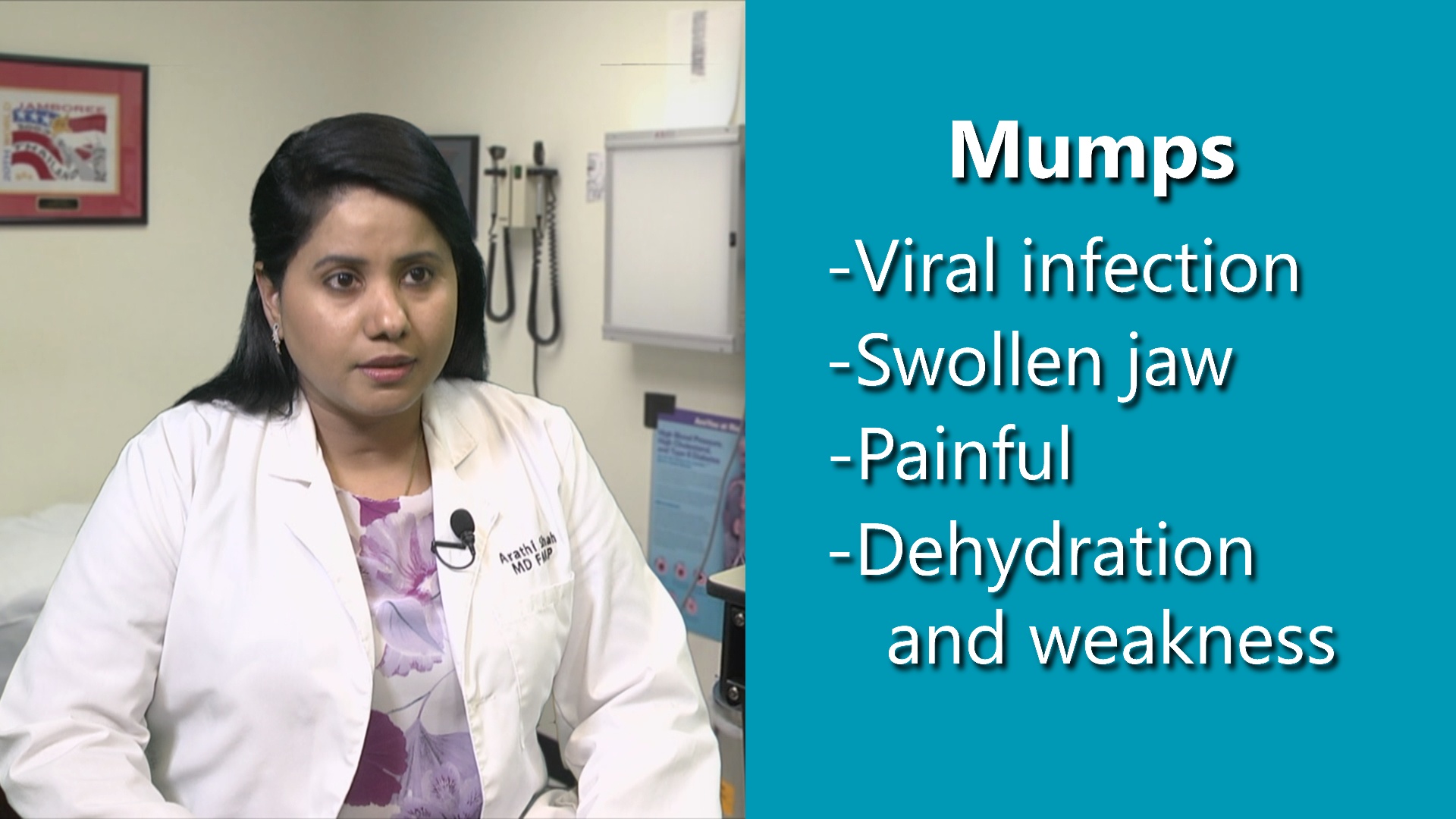March 5, 2019 (Updated March 2024)
The bottom line: Mumps is a viral contagious disease. People know mumps for patients’ swollen cheeks and jaw, but patients also suffer fever, headache, muscle aches, tiredness, and loss of appetite. Outbreaks occur every year in the United States and Texas. The MMR vaccine protects people against this disease.

Mumps is more than just a pain in the neck. New outbreaks of the contagious viral disease appear each year, yet mumps is a vaccine-preventable disease.
Patients typically get a fever, headache, muscle aches, tiredness, and loss of appetite. Then their salivary glands become swollen, causing telltale puffy cheeks and jaw.
The symptoms might not occur until two weeks after the virus has entered the person’s body, said Austin pediatrician and Texas Medical Association (TMA) physician leader Arathi Shah, MD. This poses a problem. “Someone infected with mumps can easily expose others long before knowing he or she is sick, resulting in outbreaks in crowded places like schools and colleges,” she said.
Mumps spreads easily through sneezing and coughing, or just touching infected surfaces. Most outbreaks happen in close-contact settings, such as college dormitories: Students cluster together there, often share food and drinks, kiss one another, and play sports together. But someone any age could be affected.
Although rare, mumps outbreaks still occur in the United States and in Texas. Current information on any current or recent outbreaks can be found through the Centers for Disease Control and Prevention (CDC) or Texas Department of State Health Services.
Texas has seen outbreaks too including in Houston in 2019; in 2018 at Texas Christian University in Fort Worth, Texas State University in San Marcos, and at a national cheerleading competition in Dallas; and others.
Mumps can be severe for some patients, explained Dr. Shah, who saw serious illness when she was a medical student in India.
“I saw complicated cases, with meningitis and encephalitis, or swelling of brain tissue. I also saw orchitis, painful swelling of the testicles,” she said. “It was heart-breaking to see patients suffer, especially because mumps is preventable.” In addition to these complications, some mumps patients lose their hearing.
A vaccine prevents mumps. Health officials first introduced the shot in 1967, and the number of cases soon plummeted 99 percent, according to the CDC. Doctors recommend children get two doses of the measles-mumps-rubella vaccine (commonly called MMR). Some people get the MMRV shot, which includes a chickenpox vaccine. CDC publishes the recommended mumps vaccine schedule for children and adults.
Unvaccinated adults and college-age students also can receive the vaccine, and during outbreaks, high-risk groups may need a third dose.
“Vaccination is the best way to prevent mumps and its complications,” said Dr. Shah. She also recommends people cover coughs and sneezes, wash hands with soap and water, and do not share unwashed utensils or beverages, to protect themselves.
This release is part of a TMA series highlighting contagious diseases that childhood and adult vaccinations can prevent. Some diseases covered thus far are:
TMA designed the series to inform patients of the facts about these diseases and to help them understand the benefits of vaccinations to prevent illness. Visit the TMA website to see efforts to raise immunization awareness and how funding is used to increase vaccination rates.
TMA is the largest state medical society in the nation, representing nearly 53,000 physician and medical student members. It is located in Austin and has 110 component county medical societies around the state. TMA’s key objective since 1853 is to improve the health of all Texans.
--30--
TMA Contacts: Brent Annear (512) 370-1381; cell: (512) 656-7320; email: brent.annear[at]texmed[dot]org
Marcus Cooper (512) 370-1382; cell: (512) 650-5336; email: marcus.cooper[at]texmed[dot]org
Connect with TMA on Twitter, Facebook, and Instagram.